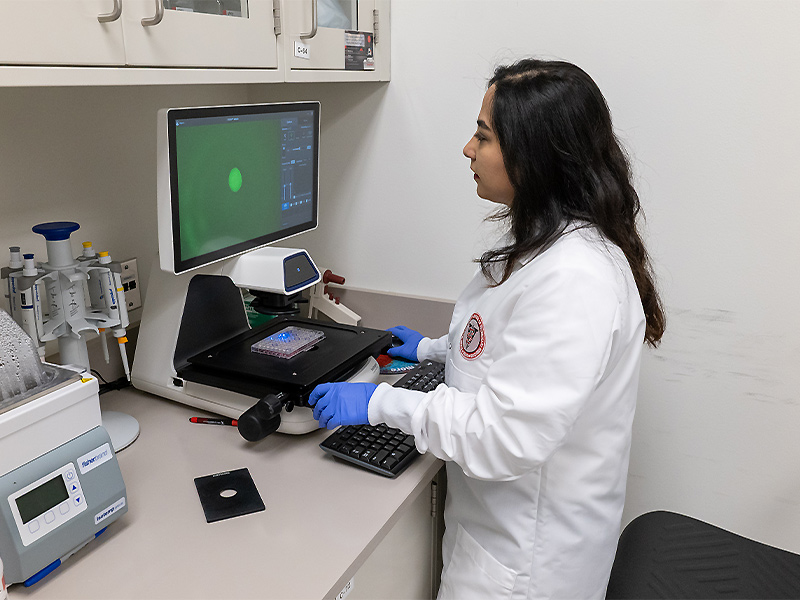
Sima Tozandehjani researches pancreatic cancer through a One Health lens.
Sima Tozandehjani thrives on taking risks in life. Some people might hesitate to embrace new and unusual experiences, but for Sima, she actively seeks them out.
“Often, these risks have led to memorable and valuable experiences that have shaped my outlook on life,” Tozandehjani said. “Whether it's trying a unique activity or exploring unfamiliar situations, I find that these adventures not only bring excitement but also contribute to my personal growth.”
In fact, it’s stepping into the unknown that led her to further her educational journey as part of the inaugural class in Texas Tech University’s School of Veterinary Medicine’s innovative Ph.D. in One Health Sciences.
Tozandehjani comes to Amarillo all the way from Iran where she was born and raised. She earned her bachelor’s in biotechnology and a master’s in biochemistry from the University of Kurdistan.
Her incredible story drives her to explore and find discoveries that will improve animal, human and ecosystem health otherwise known as One Health. Let’s get to know Sima Tozandehjani through a series of questions.
Tell us a little bit about your family. How has the culture you grew up around influenced you to be the person you are today?
My parents are originally from Iran and played pivotal roles in shaping my character. My mother, a skilled painter, instilled in me a love for artistic expression, teaching me to translate thoughts onto canvas. I used to spend a lot of time on painting, and I found it a new world in which I could create whatever I imagined.
My childhood, filled with diverse activities from painting to chess and literature classes, was a testament to my mother’s encouragement to be a versatile individual. Despite limited resources, she motivated me, emphasizing that brilliance can shine even in the darkest circumstances.
Meanwhile, my father, a diligent mechanic who often worked in challenging environments, inspired persistence and hard work. Despite him living far away from us, his unwavering support fueled my pursuit of independence and dreams. I attribute my persistence and work ethic to my father and draw inspiration from the strength exhibited by my parents.
Throughout my academic journey, Dr. Ashengroph, my master’s advisor, and other professors at the university were instrumental in shaping my mindset. Their emphasis on problem solving and critical thinking left a lasting impact. Emerging from a developing country, where challenges are abundant, I learned that failure is not an option for students determined to make a mark in the world.
In my country, people are aware of the constant presence of problems and obstacles that could easily distract them. Despite these challenges, we strive to overcome the problems and achieve our goals.
How did you find your passion in research?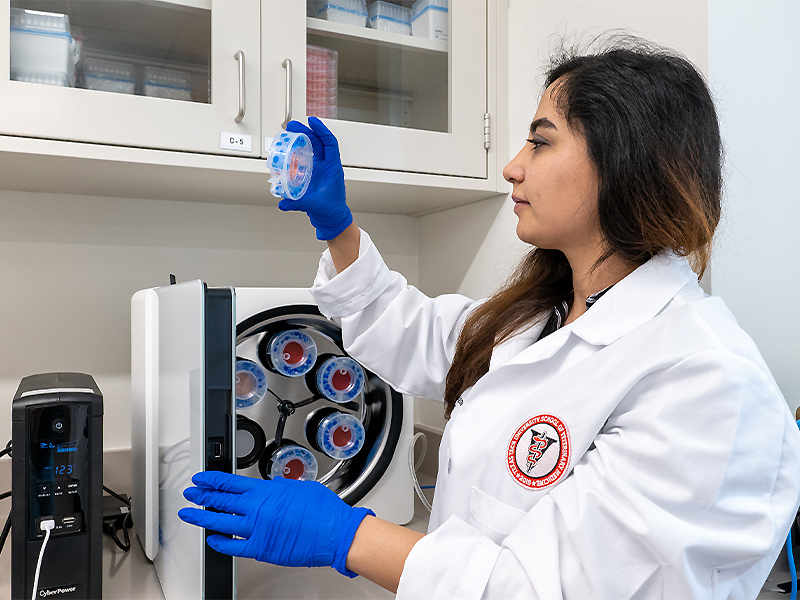
My passion for science started when my mother gifted me a small but genuine microscope that I used to inspect fruit slices. A high school teacher, who shared recent discoveries in biotechnology, further solidified my interest and led me to pursue biotechnology as my bachelor’s major.
The interdisciplinary nature of biotechnology opened my eyes to the intricate connections between animals, humans, and the environment. This realization, coupled with my master’s in biochemistry, deepened my understanding of the delicate balance at the molecular level. The health of humans is intricately tied to the health of the planet.
The Ph.D. in One Health Sciences program, which I started one year ago, brought me to a turning point in my scientific journey. Through recognizing that global issues demand collaborative efforts across disciplines, Texas Tech University has become the platform for me to contribute to enhancing the overall health of our planet.
I am passionate about the One Health program because it has empowered scientists to explore and uncover profound connections between various fields. This program facilitates the gathering of diverse ideas, bringing them together on the table. The collaborative efforts lead to the development of a comprehensive and final approach aimed at saving lives.
What inspires you to pursue what you love to do every day?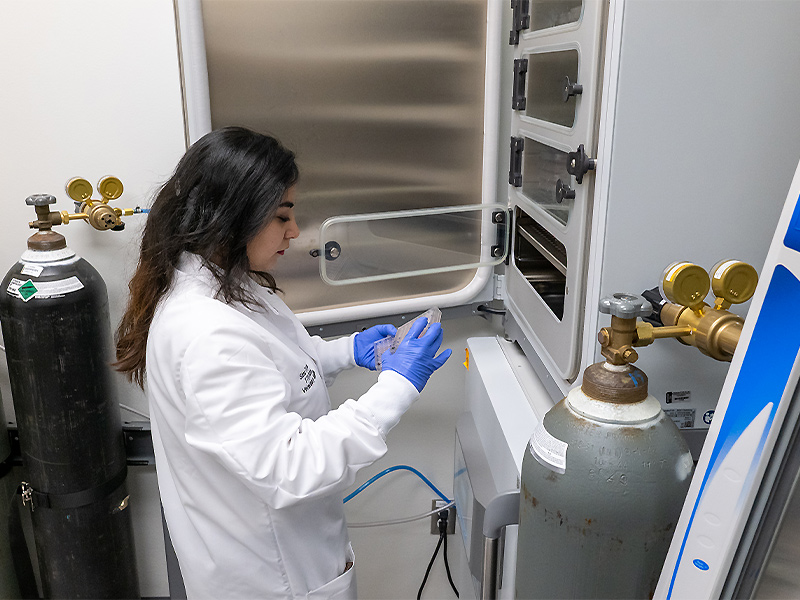
Every day, my motivation is driven by my goals. I’m deeply passionate about studying and conducting experiments regarding cancer research to make a positive impact on the lives of humans and animals battling cancer. This dedication keeps me excited and fully engaged in my work.
Why did you choose Texas Tech?
I chose Texas Tech as the starting point for my One Health career because the university not only provides a conducive environment for learning but also equips me with the resources needed for my studies. Surrounded by a community of passionate and hardworking scientists, Texas Tech fosters collaboration that goes beyond national boundaries.
What drew me to Texas Tech was its commitment to the One Health Science approach. This program brings together Ph.D. scholars from diverse nationalities, creating a dynamic environment for impactful research. The tireless efforts of Texas Tech scientists make this collaborative platform possible, emphasizing the university's dedication to pioneering positive changes in the field of science.
How is it being part of the inaugural One Health Ph.D. class at the School of Veterinary Medicine?
At the School of Veterinary Medicine, young veterinarians are dedicated to making animals better. They work hard to create a safe and healthy environment for animals, keeping them safe from harm. In my opinion, a lot of what we discover in science is thanks to animals. They offer models that closely resemble how the human body works.
Comparative medicine is a valuable science that helps scientists understand diseases that affect both animals and humans. For example, in cancer research, comparative medicine helps scientists uncover the ways tumors form and spread. The School of Veterinary Medicine’s Ph.D. in One Health Sciences program provides scientists with new animal models to better understand diseases.
By working together, veterinarians and researchers from different fields make it easier to find treatments that can improve the health of both humans and animals. This collaboration opens exciting possibilities for a healthier future, where the well-being of all creatures is interconnected and advanced through shared knowledge and teamwork.
What is your research focus?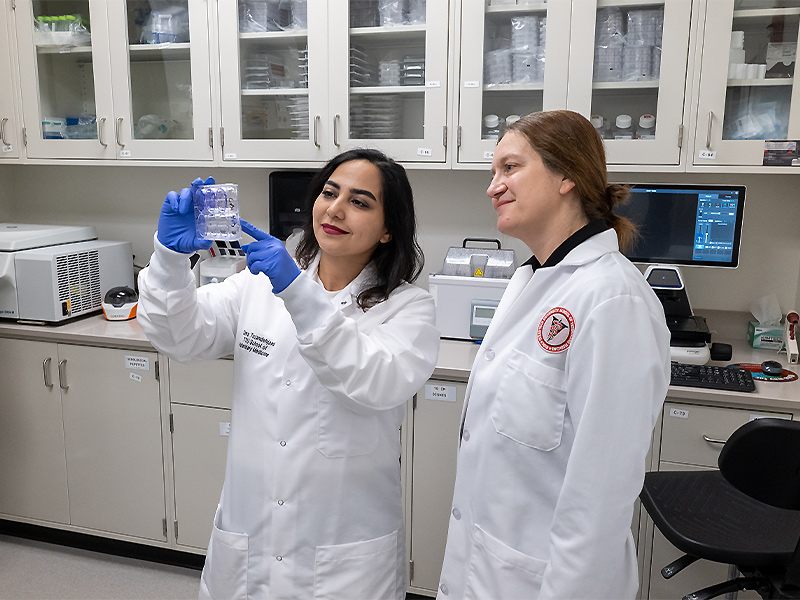
My research is focused on pancreatic cancer, which is one of the deadliest cancers with a very low patient survival rate. There is an urgent need to find a cure and enhance the quality of life for patients.
Immunotherapy development is making a significant change for patients in recent years, and some of the major targets of cancer immunotherapy are proteins that we study in our lab, called melanoma antigens or MAGEs in short. MAGEs belong to a bigger group of cancer-testis antigens, proteins that are normally expressed in testis but aberrantly expressed in different cancers. I want to uncover the role of MAGEs in pancreatic cancer.
Specifically, I wonder if and how MAGEs can reprogram the metabolism of pancreatic cancer cells and help them adapt to harsh situations, like lack of different nutrients during fast cell proliferation when a tumor grows. My project’s goal is to discover novel pathways and metabolites that cancer cells switch on to remain alive.
Who is your mentor and how are you working together? 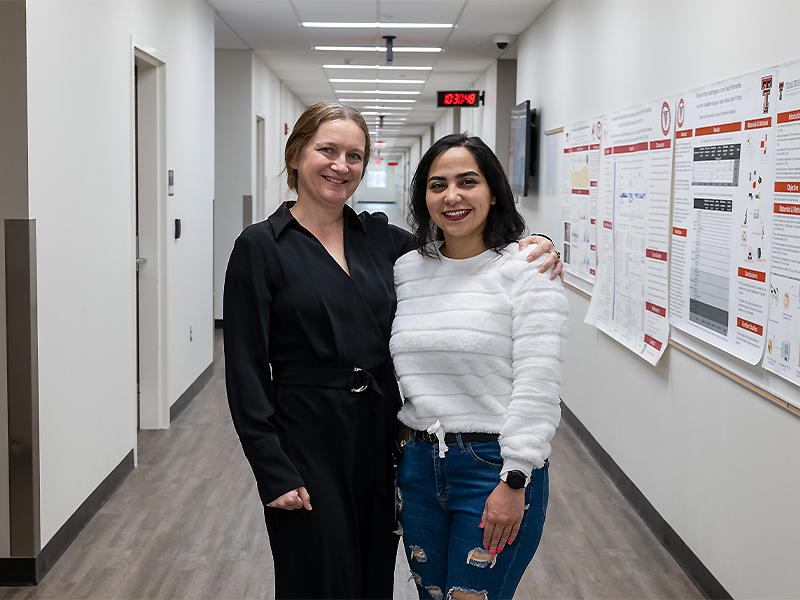
My mentor is Dr. Klementina Fon Tacer, an assistant professor in cancer biology and reproductive biology here at the School of Veterinary Medicine. Dr. Fon Tacer is a recent awardee of the Center for Cancer Prevention and Research Institute of Texas (CPRIT Scholar) with a strong interest in advancing cancer research.
Dr. Fon Tacer currently serves as the inaugural Director of the Texas Center for Comparative Cancer Research (TC3R) at the School of Veterinary Medicine, a multidisciplinary research program that facilitates collaboration between scientists and clinicians for the advancement of cancer treatment for humans and animals. My project and work are also part of the TC3R.
Dr. Fon Tacer has been a role model for me by creating a warm atmosphere in the lab that makes us feel the University is a second home, which is very important for us who live so far away from our families. She shows respect for my ideas and thoughts, and stimulates me to be a creative, independent thinker who is unafraid to ask questions. Her support, guidance and knowledge remind me that teachers can nurture human beings who make a big difference in the world.
Under her supervision, I’m diving deep into cancer metabolism and will collaborate on different projects in addition to working on my own. Diligence and collaborative research are at the very core of the Fon Tacer lab. I am grateful for the support and guidance, which has been pivotal in my journey toward my goal of being a successful scientist in the field of cancer research.
What are your plans after completing the One Health Ph.D. Program?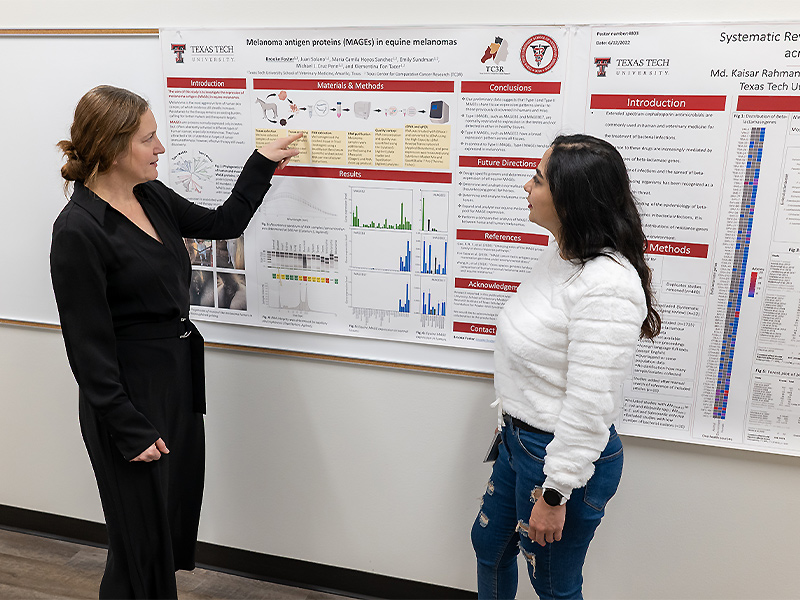
I want to do a postdoctoral fellowship in one of the best labs in the field of tumor metabolism to expand my knowledge and skills before transitioning into industry, which is my ultimate goal. I believe this career path will allow me to apply my research skills in a practical setting and contribute to meaningful advancements in cancer therapeutics.
What are your favorite things to do outside of school?
I’m an avid chess player and recently earned the title of the School of Veterinary Medicine’s chess tournament champion. I go to the Amarillo Chess Club once a week to practice and progress. For me, chess is not just a leisurely activity but a way of life that taught me to fight until the end and not quit to protect all that I love.
I also watch science fiction and documentary movies whenever I have time. I have a keen interest in traveling to explore new places, meet diverse groups of people, and immerse myself in different cultures. Embracing these experiences allows me to broaden my perspectives and deepen my understanding of the world around me.
